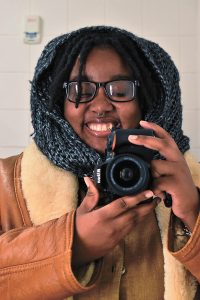FFRF awarded Atira $1,500.
By Atira Claude
I lost God when I was 17 years old. For context, I was raised in a Christian religious household since birth and had always identified with my family’s religion. (The realization in early adolescence that I was queer had only slightly affected the foundation of those beliefs.) But then came the summer of 2020. Growing up as a Black person in America, I already understood that there were numerous forces in the world that would hate me simply because I draw breath. Being raised by educated, conscientious parents, I understood the long and painful history of my people’s suffering at the hands of the police, the government and domestic terrorists. But in a year where a pandemic had already stolen our collective sense of normalcy (and the lives of my loved ones) I saw a Black man once again be murdered, and no real justice dealt.
My people marched, protested, appealed to local politicians and the president himself. But when the year was over, one more murderer might’ve been found guilty, but nothing had changed. And I had prayed. We’d all prayed, as Black people so often do — pray for protection, salvation, retribution. And nothing changed. That makes a kid think. And it made me start to unravel all the moments I’d trusted God and cried out on bended knee for help, only to be met with an echo. And I’m not the only one.
My generation was raised with the promise that we would inherit the Earth, that our future was bright, and that if we kept the faith and stayed pure, everything would be OK. But here we are, barely grown, and we are watching the world burn all around us. We watch global temperatures continue to rise, we see our rights being stripped away, we see cops assault people protesting tyranny, we see war and genocide go unchallenged, and the power of billionaires grow while we are dying. These things have damaged our hope. And in the midst of all this, why would we beg the help of any god? When so many of our prayers went unanswered as children, why would we waste time on religion as adults? Real life, and all of its intricacies, is warping before our eyes; we don’t need to grovel aimlessly.
Because of this rejection of religion, I can see my generation heal so many old wounds. Because many of us stopped putting our faith in a god to save us, we have begun to place faith in each other, building community and extending an empathy toward our peers that is transformative. I have seen my generation mobilize many times to get money, food and many other kinds of aid to those in need across the globe. I have watched my peers, since the summer of 2020 and to this day, put their bodies on the line again and again to protest injustice and hold those in power accountable for their corruption. When we stop waiting on a god for salvation, we realize we can save ourselves.
I also see my generation turning inward to embrace therapy, deeper interpersonal relationships, radical honesty and pride in individual identity — all things that religious culture warned us against. And while we are still deeply flawed as people, these trends in behavior and community care bring some of my hope back. I might’ve lost God when I was 17, but I gained a sense of self and belief in those around me that has made me a more grateful and impassioned human being. And this is where my belief lies now, that humans owe each other safety, empathy and mutual aid. And when we rise to meet these needs, we can make the world a better place. Religious or not.
Atira, 21, is from Hollywood, Fla., and attends Florida Atlantic University and is majoring in multimedia studies.
“Writing was one of my earliest forms of self-expression but now I paint, photograph, act, the works,” Atira writes. “Filmmaking is my biggest passion. It encompasses all the forms of art I love, with room for ever-evolving ways to make more unique projects.”

